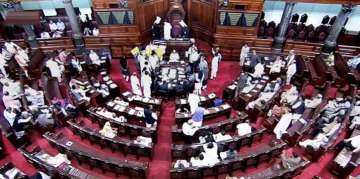The Rajya Sabha on Monday cleared a bill providing greater clarity to bankruptcy law and timely resolution of the cases.
Replying to a debate on the amendment in Insolvency and Bankruptcy Code (IBC), Union Finance Minister Nirmala Sithraman said the seven proposed changes in the law are to largely remove the ambiguities and facilitate smooth conduct of the corporate and insolvency resolution process.
It seeks to maximize the outcomes in line with the spirit of the Code, she said.
This is the third amendment in the bankruptcy law since it came into force in 2016. The first bill amended 8 clauses while the second bill amended 38 clauses. The present amendment would bring change in eight clauses of the IBC.
The proposed changes in the bankruptcy law are aimed at completing the corporate insolvency resolution process (CIRP) within an overall time limit of 330 days including litigation and other judicial processes, maximizing value for corporate debtor and plugging various loopholes.
The Bill has proposed that if an application under the bankruptcy law is not admitted or rejected within 14 days by the adjudicating authority, it shall provide the reasons in writing.
At present, the resolution plan for a bankrupt company has to be cleared within 270 days.
Once the amendments are cleared by Parliament and become part of the law, it is expected that there would be clarity on allowing comprehensive corporate restructuring schemes such as mergers, demergers and amalgamations as part of the resolution plan.
The Finance Minister noted observations by some members during the debate that the bankruptcy law had resulted in behavioural change among businesses. She said that as many as 6,079 cases had been disposed even before admission. This resulted in realization of Rs 2.84 lakh crore.
"It is an indication of effective mechanism (under the bankruptcy law)," the Minister said.
Sitharaman hopes that the proposed amendments will help in timely disposal of cases. She said that the delay at admission stage was itself worrying. Also, the issues related to interpretation will also be settled.
Referring to interpretation by bankruptcy court, she said that with such interpretative problems that were coming up, it was only incumbent upon the government to bring the amendment.
"So, the intent of the government is to maximize value of a corporate debtor as a going concern while simultaneously adhering to strict timelines," the Minister said.
Participating in the discussion earlier, senior Congress leader Kapil Sibal said the government had brought a legislation deciding the rights of parties while the matter is pending in the Supreme Court.
"How can the legislation attempt to resolve a judicial dispute? That dispute will be decided by the court. And, you have given this legislation a retrospective effect. I am really surprised," he said.
He said that this will not stand in a court of law.
"While, some of these amendments, of course, are salutary and the direction is right, but, I do not think that these kinds of legislations should be decided and bulldozed through Parliament without referring the matter to the Select Committee," said Sibal.
Latest India News
